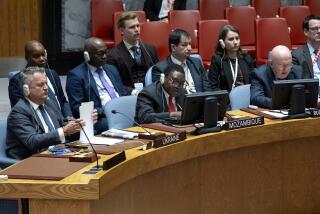Iraqi Menace Refuses to Fade
- Share via
Earlier this month the head of the special U.N. commission trying to make sure that Iraq is no longer hiding weapons of mass destruction reported to the Security Council that his inspectors were still being obstructed by Iraqi officials. Further, said Richard Butler, Australia’s former U.N. ambassador, Baghdad had failed to “give a remotely credible account” of its secret arms programs, especially its biological weapons. That report should have set off alarm bells in the Security Council and led to tougher measures against Saddam Hussein’s regime. It has not, chiefly because China, France and Russia, which all have veto power, and Egypt, which holds a rotating seat on the council, insisted on taking a softer approach than the United States, Britain and eight other council members wanted.
The result was a diluted resolution that threatens to ban international travel by Iraqi officials, starting next April, unless cooperation improves. This can hardly be mistaken for the kind of no-nonsense warning that would prompt Saddam Hussein to begin giving U.N. inspectors the information they want. Rather, the most unmistakable breakdown yet in Security Council unanimity on the resolutions it adopted after Iraq’s invasion of Kuwait seems sure to embolden Baghdad as it maneuvers to preserve a covert unconventional weapons capability.
The milder position insisted on by France and Russia--which look ahead to profitable commercial ties with Iraq once U.N. sanctions are lifted--and by China, which also is eager to sell to Iraq, threatens to undercut further the U.N. inspectors’ effectiveness. The consequences of Iraqi cheating could one day prove horrifying. An Iraq armed with biological weapons and the missiles to deliver them would once again make Saddam Hussein a regional menace. Iraq’s defeat in 1991 was supposed to have ended that threat. Time may prove that in fact it did nothing more than temporarily suspend it.
More to Read
Sign up for Essential California
The most important California stories and recommendations in your inbox every morning.
You may occasionally receive promotional content from the Los Angeles Times.













